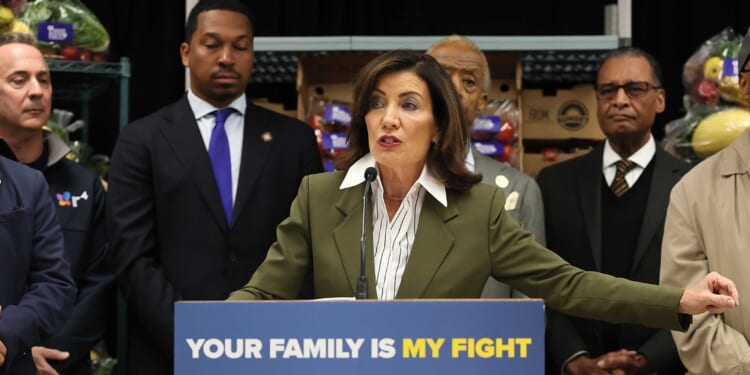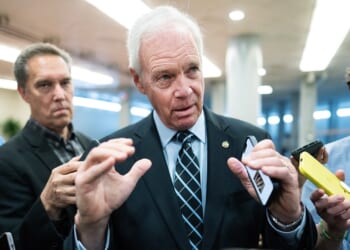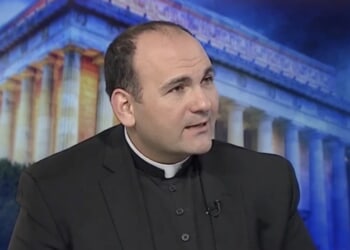The votes have been counted, the concession speeches have been given, and after one of the wildest mayoral races in New York’s recent history, we have a winner. Zohran Mamdani will take office as Gotham’s next mayor on January 1, 2026. But while the final tallies identified Andrew Cuomo and Curtis Sliwa as the losers, the name of the real loser didn’t even appear on the ballot: Governor Kathy Hochul.
Beyond Left and Right, liberal and conservative, Upstate and Downstate, history suggests that the New York State governor’s chief political adversary is the mayor of the Big Apple. While Hochul and Mamdani are both Democrats and Hochul (eventually) endorsed Mamdani’s candidacy, these two may become bitter political enemies, further imperiling Hochul’s already-difficult reelection campaign.
Finally, a reason to check your email.
Sign up for our free newsletter today.
The relationship between the state’s capital and its largest municipality has always been complicated. The governor plays a leading role in the administration of the institutions that shape life in New York City, from the Metropolitan Transit Administration to the City University of New York. The mayor, by contrast, is at best a supporting player in these entities’ operations. Given these legal and governmental tensions, it’s no surprise that governors and mayors, even those of the same party and ideological persuasion, often find themselves at each other’s throats.
Recent history is littered with examples of contentious relationships between Albany and Gotham.
On the surface, Governor Nelson Rockefeller and Mayor John Lindsay should have been the closest of allies. Both were liberal Republican bluebloods with national followings. But their relationship was fraught with disagreements and public sniping. Famously, Rockefeller proposed seizing control of the Big Apple’s sanitation department to end a strike on terms that Lindsay opposed. While he began his political career as a Republican, Lindsay eventually won reelection as the Liberal Party candidate and became a Democrat during his second mayoral term.
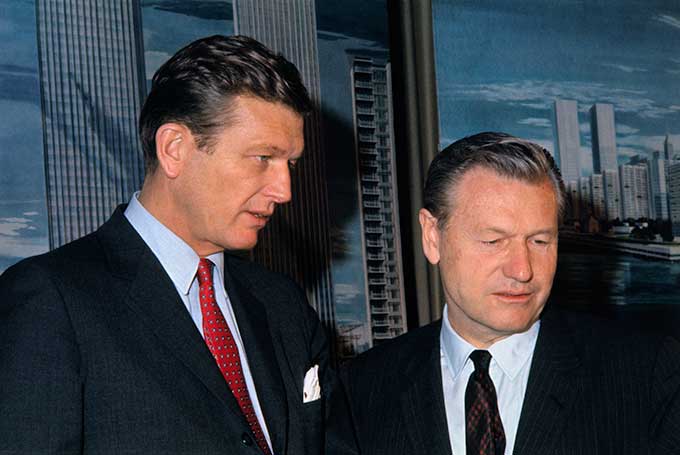
The Lindsay-Rockefeller rivalry paled in comparison with that between Governor Mario Cuomo and Mayor Ed Koch. Cuomo and Koch’s first run-in came during 1977’s New York Democratic mayoral primary. In a nasty, multicandidate race, Koch, a centrist Democratic congressman from Manhattan, defeated the more liberal Cuomo, a Queens native then serving as New York’s secretary of state. While he lost the primary, Cuomo ran an aggressive general election campaign as the Liberal Party’s candidate for mayor. Koch won the general election, but Cuomo, as a third-party candidate, made the race closer than anyone would have expected.
The 1977 mayor’s race was only the beginning of the Cuomo-Koch rivalry. In 1982, Koch and then-Lieutenant Governor Cuomo faced off in New York’s Democratic gubernatorial primary. Koch won the backing of the state’s Democratic committee, but Cuomo narrowly won the primary. Cuomo proceeded to win the general election and served three terms as governor of the Empire State. The animosity between him and Koch endured throughout their tenures in public office.
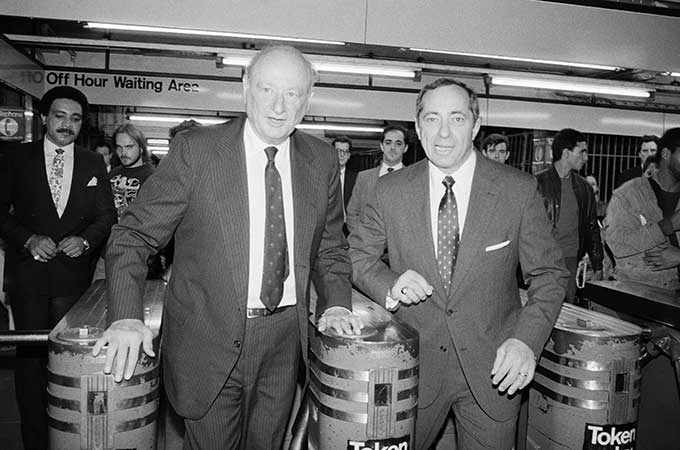
Equally tempestuous was the relationship between George Pataki, New York’s last Republican governor, and fellow Republican Rudy Giuliani, New York City’s mayor from 1994 to 2001. The conflict between the two began before Pataki even took office as governor, when Giuliani endorsed Cuomo for reelection over Pataki. Pataki won, and the relationship between him and Giuliani would never improve.
When Giuliani considered running for the U.S. Senate in 2000, Pataki remained neutral, but many believe that he really Congressman Rick Lazio to be the GOP nominee. Giuliani wound up dropping out of the Senate race for health reasons; Lazio became the Republican nominee but lost the general election to Hillary Clinton.
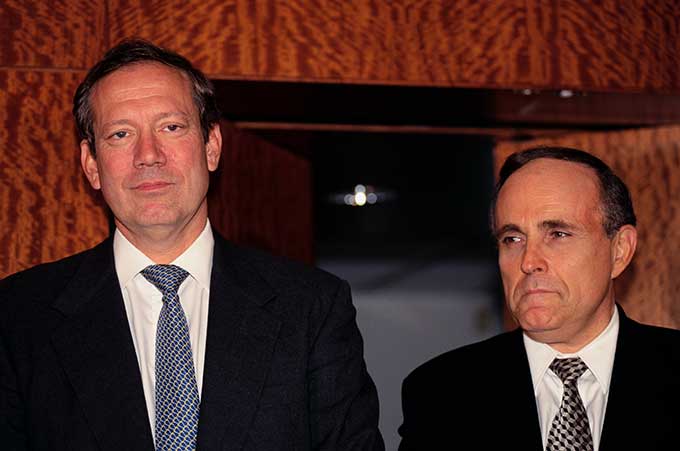
Perhaps no governor-mayor relationship in recent decades has been as sour as that between Governor Andrew Cuomo and Mayor Bill de Blasio. The careers of Cuomo and de Blasio crossed paths long before either held the top jobs in city and state government. As regional administrator of the U.S. Department of Housing and Urban Development under President Bill Clinton, de Blasio actually worked for then-HUD Secretary Cuomo.
After being elected mayor of New York in 2013, de Blasio forged a decidedly progressive administration. This never sat well with the more middle-of-the-road Cuomo. The two clashed over everything from taxes to MTA funding to public housing policy. Their nastiest and most public battle came at the outset of the Covid pandemic, when the two engaged in power struggles over who had the authority to close schools.
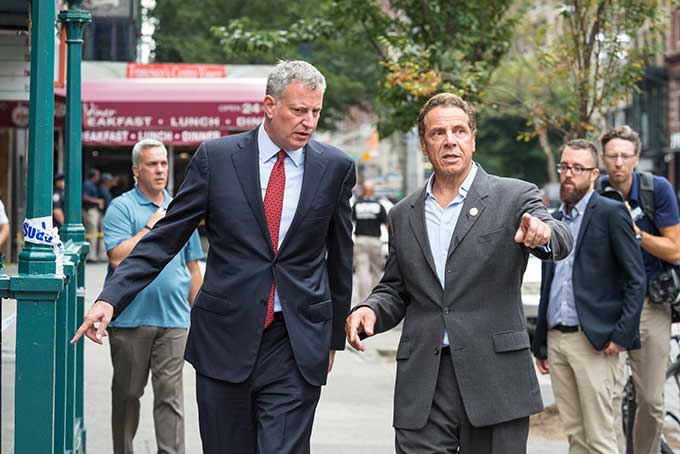
The animosity between Cuomo and de Blasio resurfaced during the 2025 New York City mayor’s race. De Blasio emerged as a major booster of his fellow left-winger, Zohran Mamdani. Even before Mamdani defeated Cuomo in the Democratic primary, de Blasio said that he didn’t think Cuomo should be mayor.
Before long, Kathy Hochul, like Rockefeller, Pataki, and both Cuomos before her, is likely to find herself at odds with the Big Apple’s new mayor. And this state-city conflict may well sink the already unpopular governor’s 2026 reelection.
While Hochul endorsed the mayoral candidacy of democratic socialist Mamdani, her support came late and was clearly half-hearted. Hochul began her political career as a moderate Democrat from Buffalo’s suburbs; she has never been a favorite of the progressives and democratic socialists in Mamdani’s orbit. Much of Mamdani’s agenda cannot be accomplished without Albany’s blessing.
Is Hochul, facing voters next year, likely to sign off on Mamdani’s more progressive tax and housing proposals? Most pundits say no. But one thing is for sure: if the governor appears to be standing in the way of Mamdani’s initiatives, the new mayor and his comrades will make Hochul pay a political price. The built-in political cache that comes with being mayor—and not just their likely policy differences—makes Mamdani a natural rival of Hochul’s. If history is any guide, the new mayor of New York will almost certainly add to Hochul’s political headaches.
Top Photo by Michael M. Santiago/Getty Images
City Journal is a publication of the Manhattan Institute for Policy Research (MI), a leading free-market think tank. Are you interested in supporting the magazine? As a 501(c)(3) nonprofit, donations in support of MI and City Journal are fully tax-deductible as provided by law (EIN #13-2912529).
Source link

